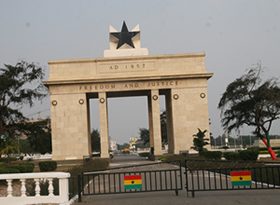 Ghana has agreed with four other West African neighbours to invest and expand the Lagos- Abidjan highway into a six-lane road to among others boost trade among them.
Ghana has agreed with four other West African neighbours to invest and expand the Lagos- Abidjan highway into a six-lane road to among others boost trade among them.
The leaders of the five countries- Nigeria, Benin, Togo, Ghana and Cote d’Ivoire- met on the sideline of the ongoing 21st Ordinary Session of the Assembly of Heads of State and Government of the African Union and agreed to commence the expansion project in 2014.
The highway will also provide a vital link to sea ports for the landlocked countries in the sub-region including Burkina Faso, Mali and Niger. It is also expected to augment the productive infrastructure of the sub-region and make the corridor more viable for doing business.
Foreign Minister Hanna S. Tetteh told journalists in Addis Ababa, Ethiopia, that, the five leaders had agreed to complete modalities for the joint funding of the project before the 2014 start date of construction.
She disclosed that, the sector ministers of the respective countries had been tasked to develop a blue print for the actualisation of the highway corridor project, and “this will be presented to the heads of state at the next ECOWAS Summit in July.”
Ms Tetteh said President John Mahama’s meeting with the Guinean President, Alpha Conde, centered on enhancing collaboration between the two countries. President Conde also expressed his country’s interest in doing business with Ghana in the areas of energy, minerals and the development of regulatory frameworks in these areas.
The two leaders also discussed the need to urgently establish a joint commission of cooperation to facilitate trade between the two countries.
President Mahama invited the Guinean leader to visit Ghana at his earliest convenience to firm up their discussions.
The UNDP Administrator, Helen Clark, also called on President Mahama to discuss the request from the UN to President Mahama to champion the cause of human settlements and urban planning among colleague heads of state.
“Ghana is well positioned to serve as a champion for reinvigorating the African Urban Agenda. It is for this reason that the UN Habitat would like to forge an alliance with Ghana, particularly through His Excellency, to put human settlement and sustainable urbanisation at the centre of development in Africa”, Ms Tetteh quoted Helen Clark as saying.
According to the Minister, President Mahama will in September, during the UN General Assembly, convene a meeting of African leaders and the UN System to discuss how to put the twin issues of human settlement and urban planning at the centre of Africa’s development plans.
It is estimated that by 2030, 60% of Africa’s population will be living in cities. This requires effective planning now to ease the anticipated pressure on existing infrastructure.
Earlier at a closed door meeting of Heads of State and Government of the African Union, Ms Tetteh said, President Mahama made a case for transparency in the funding of the Union as it looks to expand sources for funds for its operations.
Source: Media Office
Flagstaff House Communications Bureau
Office of the President
Accra











